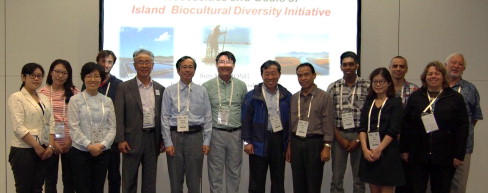Island biocultural diversity and traditional ecological knowledge
Editorial
Institution for Marine & Island Cultures (MIC), Mokpo National University, Republic of Korea landskhong@gmail.com
Centre for Sustainability (CSAFE), University of Otago, New Zealand priscilla.wehi@otago.ac.nz
Faculty of Environment and Information Sciences, Yokohama National University, Japan matsuda@ynu.ac.jp
Ecologists have exhorted business people and politicians of first world countries to reconsider their views on issues such as climate change and the costs of development. Using both quantitative and qualitative data, they have demonstrated how humans are dependent on organisms and ecosystems; how culture is connected to biodiversity; and how culture has been created. Nonetheless, these issues are not always accorded the attention they deserve. The United Nations designated the year 2010 as the International Year of Biodiversity and International Year of Rapprochement of Cultures. The importance of this designation at a time when the earth’s ecosystems are being destroyed by climate change, reckless development, unsustainable resource use, and environmental pollution, and while the value of biocultural diversity continues to decline, cannot be overestimated. To celebrate the International Year of Biodiversity and International Year of Rapprochement of Cultures, a number of programs were undertaken. To this end, “The International Conference on Biological and Cultural Diversity for Development” was held in Montreal, Canada from June 8th to 10th, 2010.
The ‘Island biocultural diversity and traditional ecological knowledge’ symposium, held during the International Congress of Ecology (INTECOL 2013, London), is the first activity of the ‘Island Biocultural Diversity Initiative’. The initiative was formed to specifically realize the agenda of “Strengthening Biocultural Diversity and Traditional Ecological Knowledge in Asia-Pacific Island Regions,” an agenda that was initiated and accepted as a resolution during the 5th World Conservation Congress (WCC) in September 2012 at Jeju, Korea. The INTECOL symposium was an academic meeting designed to develop international networks, and provide support for both domestic and international researchers working on this agenda. In the symposium, there were two keynote addresses by two researchers associated with the subject. First, with an explanation about the biocultural diversity and ecological diversity of Japan’s islands, Hiroyuki Matsuda (of Japan) introduced the features of the UNESCO Biosphere Reserve as a sustainable biocultural diversity conservation model, and introduced the cases of Japan’s Japanese Archipelago, including the Yakushima Islands. Secondly, Priscilla Wehi (of New Zealand) examined the development of traditional ecological knowledge by the indigenous Maaori people in New Zealand, through a linguistic analysis of oral tradition. She discussed the evidence from oral tradition in light of biological evidence on species extinctions in New Zealand since human arrival. A further nine general presentations were made in the symposium. One of these was by China’s Zheng Yuan, who described the traditional management methods and landscape diversity of the terrain-type farm lands that have been sustained for about 1000 years, by using the landscape topography of Yunnan Province in China. This was – albeit not on a subject related to islands – an important presentation which formulated general concepts about mutual interactions between biocultural diversity and landscape diversity. Anurasiri Nalaka Geekiyanage Don (of Sri Lanka) introduced traditional knowledge about water use that has been handed down from ancient times. In particular, because it has many original-type features of the cascades style of rice paddy farming of Asian countries, including South Korea, this model of water use provides valuable material for future comparative studies of farming methods in Asian island regions. Hong-Gu Kang (of South Korea) discussed long term human impacts during the preservation and development of Gotjawal Forest in Jeju Island, Korea; whereas Inocencio Buot Jr. (of Indonesia) introduced traditional knowledge on the utilization of mangrove forests by coastal region residents,, including Panay Island residents, in the Philippines. Hemi Whaanga (of New Zealand) reviewed examples of species nomenclature in recently colonized countries that diverge from classic Linnaean standards, and asserted the need to consider cultural values if scientists name newly discovered species in this way. Jae-Eun Kim (of Korea) analyzed the impact of reclamation and constructions on local bioculture from a landscape ecological perspective. In addition, a quantitative assessment was conducted and the value of ecosystems for ecosystem services in the tidal areas of archipelago in Korea was analyzed. Through a case study, Jong-Geel Je (of South Korea) demonstrated the close relationship between organisms living in Daebu Island in Gyeonggi Bay and the fishing tools utilized by fishing village residents; the shapes of fishing tools are closely associated with both the physical and ecological characteristics of habitats of the applicable organisms. Grace Hahm (of South Korea) introduced traditional knowledge about the use of natural resources by the residents of Jeju Island, and she proposed ideas for sustainable use, in a modern sense. Lastly, Sun-Kee Hong (of South Korea) provided background explanations about the 5th World Conservation Congress (organized by IUCN) held in Jeju in 2012. He then discussed the background of the launched “Initiative” and a cooperation framework with the researchers. The symposium was a forum to discuss the characteristics – and the status of activities – of the ecological cultures of the island regions of the Indian and Pacific Ocean regions including Northeast Asia. In this special issue, a few papers selected during the presentations at the symposium have been collected and organized. This symposium was endorsed by East Asia Federation of Ecological Societies (EAFES) and it was one of post-activity and research related to 5th WCC (IUCN Congress) as part of motion “Strengthening Biocultural Diversity and Traditional Ecological Knowledge in Asia-Pacific Island Regions” supported by Ministry of Environment, Korea (Fig. 1).

Acknowledgements
This work was supported by the National Research Foundation of Korea Grant funded by the Korean Government (MEST)(NRF-2009-361-A00007). Our thanks are extended to Ministry of Environment, Korea and East Asian Federation of Ecological Societies as well as the organizing committee of INTECOL 2013.
